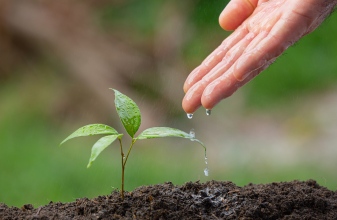Soil and Water Conservation
Technology in soil and water conservation has significantly improved the efficiency of agricultural systems and ensured sustainable land management. In modern times, farmers who continue using outdated practices risk soil degradation, water scarcity, and reduced crop productivity. Soil and water conservation involves using scientific and mechanical methods to prevent erosion, improve water retention, and sustain land fertility.
There are many techniques used in conservation practices—such as contour ploughing, check dams, rainwater harvesting, mulching, and drip irrigation systems. These are applied in both dryland and irrigated farming. Especially with the growing challenges of climate change and groundwater depletion, soil and water conservation is an indispensable part of modern and resilient agricultural development.

Programme Objectives
The programme is designed to educate students for a future in sustainable agriculture, where they will play an essential part in conserving natural resources for future generations. Among the program’s objectives are the following:
- Develop a solid foundation in soil science, water resource management, and land surveying.
- Learn about various conservation methods, structures, and their application in different agro-climatic regions.
- Gain practical lessons on designing and implementing soil and water conservation techniques on farms.
- Build abilities in assessing land degradation issues, hydrology, and water use efficiency.
- Understand the role of conservation in sustainable agriculture and climate-resilient farming systems.
Course Duration
Bachelor of Vocational Studies (B.Voc) is a three-year degree program offered at Kalinga University.
Eligibility
The minimum eligibility to take admission in B.Voc is 10+2 (in any stream) or equivalent or 2 year ITI Diploma after Class 10th or 3 Year Polytechnic Diploma after Class 10th.
Career Path
The Bachelor of Vocation program equips graduates with the necessary knowledge and skills to work in various job areas in the agriculture and environmental conservation sectors. Some of the job areas that graduates can explore include:
Job Area | Job Description |
Soil Conservation Technician | Implement and monitor soil conservation practices. Work with agricultural departments or NGOs in rural development projects. |
Water Resource Assistant | Assist in managing irrigation systems, water budgeting, and rainwater harvesting. Work with watershed agencies and farming cooperatives. |
Irrigation Planner | Design and maintain efficient irrigation systems like drip and sprinkler. Work in agriculture, horticulture, or landscaping sectors. |
Environmental Field Assistant | Support environmental conservation programs focusing on soil erosion control and water management. Work with NGOs or research institutes. |
Agro-ecological Survey Technician | Conduct soil and land capability assessments for farming and development projects. Work with planning authorities or consultancy firms. |
Fees Structure
| S.No | Name of the Course | Registration Fee (One Time) | Course Fee (Per Sem) | Exam Fee (Per Sem) | Re-Reg Fee* (Per Sem) | Total |
|---|---|---|---|---|---|---|
| 1 | Soil and Water Conservation | 1,500 | 15,000 | 1,000 | 500 | 100,000 |
Programme Scheme
Syllabus
Admission Procedure

Eligibility
The minimum eligibility for admission in B.Voc is 10+2 (in any stream) or equivalent or a two-year ITI Diploma after Class 10th or a three-year Polytechnic Diploma after Class 10th.

About Fees Structure
Selected candidates will have to deposit the fee within ten working days after the declaration of the Successful candidate’s list. Students can pay the fee by any mode – Online/ Cheque/Draft.

Academic Calendar
The academic calendar of Kalinga University will be followed for all academic and examination matters.

Discipline
The students of the programme will be governed by the University rules in regard to minimum attendance and evaluation for the award of a Degree Certificate.
